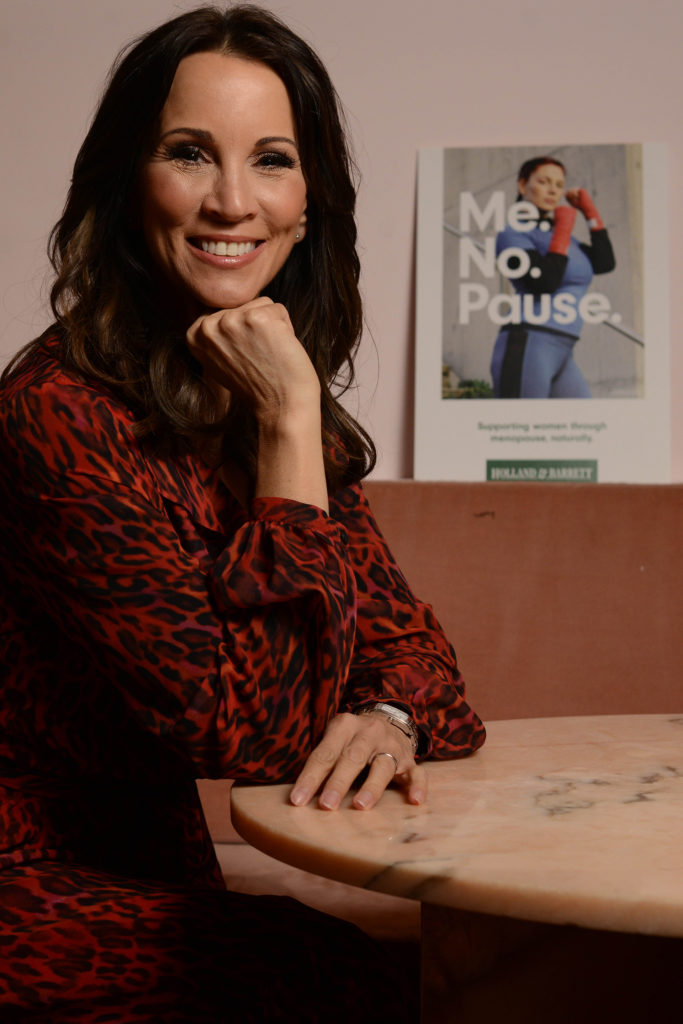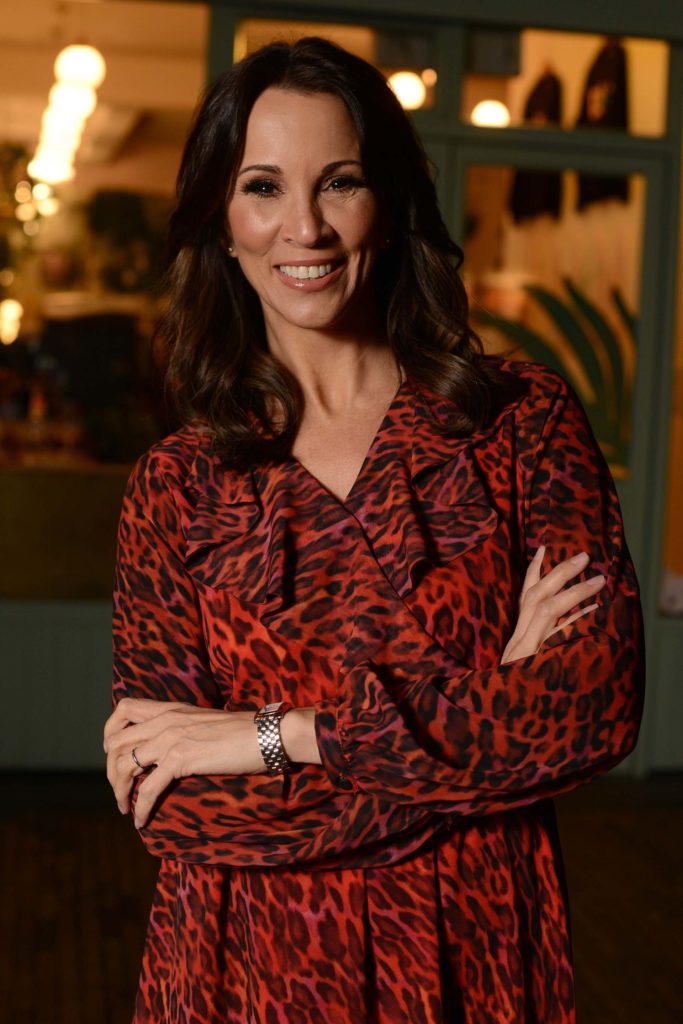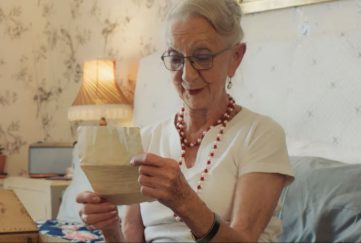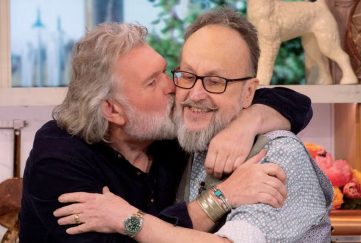TV Loose Women’s Andrea McLean Says We Need To Talk About Menopause NOW!
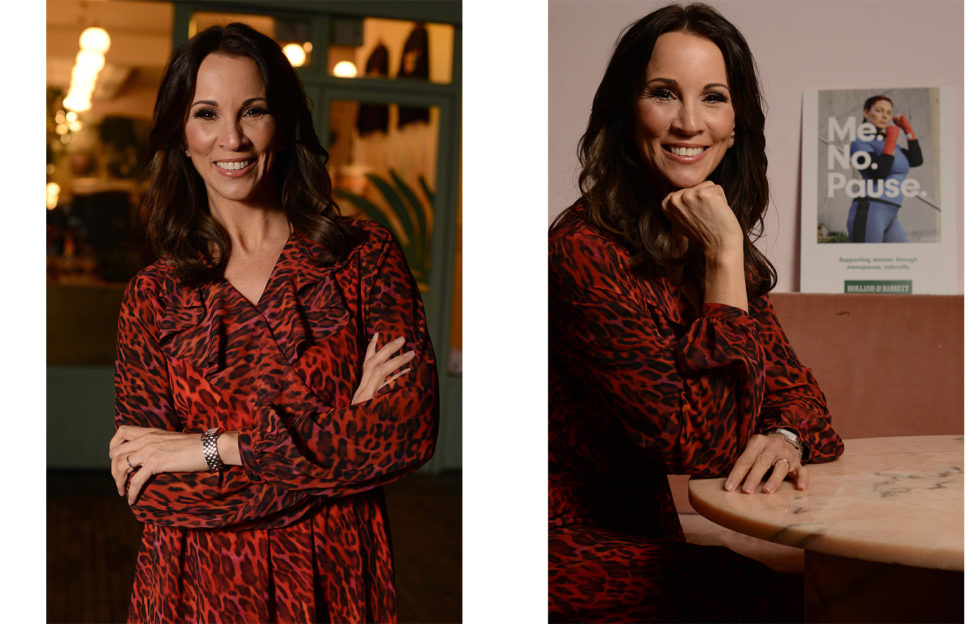
Andrea McLean is supporting Holland & Barrett’s Me.No.Pause campaign, which aims to break the taboos around menopause and support women through it naturally. Find out more at hollandandbarrett.com or visit one of their 800 UK stores today.
Q: Tell us about your menopause journey
“I think my experience with menopause is a journey, like many other women, in that it is unique to me.
“It’s always changing, I have times where I think, ‘Oh, yeah, I’m completely all over this and I’ve got it, and I feel great’, but then I have days where I really don’t feel very great.
“When I had my hysterectomy I didn’t realise the full impact of having my ovaries removed. It means you go into full surgical menopause, and even after this I thought once I started taking hormone replacement therapy (HRT) and looking after myself then that’s it, you’re fixed. But actually going through the menopause is a bit like gardening. You get it all planted and all the bulbs come up and you get everything all looking all lovely and think, ‘Oh, I’m done now’. But it’s not like that. You have to keep watering it and you have to keep feeding it with all the different minerals and vitamins and everything that your garden needs.
“It’s a full-time job just keeping an eye on the menopause. So, for me, that’s how my menopause is. I remember when I first got into gardening, I thought it was like decorating. You just literally paint it, put some new cushions in and walked away and it was done. Gardening isn’t like that. It’s a full-time thing you have to keep an eye on, and the menopause is the same.
“It’s all about trial and error, lifestyle changes like mediation will work and then it might not work for a little bit and then you have to try something else. The most important thing I’ve learned is that you need to listen to your body. Don’t keep thinking that you can wrestle it to the ground and make it do what you want it to do because it just won’t. You have to be kind to yourself.”
Q: For any women just starting to go through the menopause what would be your most important piece of advice?
“My most important piece of advice would be look up the 34 symptoms of the menopause because a lot of the time we are very misguided. Many women simply think, ‘Well, the menopause only happens when you’re 51,’ but that’s just an arbitrary age I personally think was just plucked out the sky, because that’s the age that statistically women are most likely to stop ovulating.
“But you can actually start going through the menopause in your early 40s and in rare cases 30s. And to discount a whole decade purely because some statistician has said so is absolute hogwash. So I advise all women to get the list of the 34 symptoms of the menopause, and you will know once you start going through them where your body is at.
“When you start thinking, ‘Actually I have that, I have that, I have that, and I have that,’ it will become as clear as the nose on your face whether you’re, ‘Okay, not quite there yet… Things are just starting to change a little bit… Or I’m right in it’.
“I think one of the biggest problems women have is they’re not taken seriously when they go to their GP, because they can’t quite pin down why they’re not feeling like themselves. And because GPs are trained to only ask, ‘When did you last have a period?’, that’s just one tiny bit of it. There’s so many more symptoms, so read the list and get to know your own body before visiting the GP, you’ll have a much better outcome.”
Q: What simple day-to-day changes can menopausal women make to relieve those horrible symptoms?
“The most powerful thing you can do is go for a walk. And it is so simple. It helps you both mentally and physically. People will say ‘I do all the right things, and I still have the symptoms of the menopause’, and whilst it doesn’t make it go away, if you’re having a moment such as a hot flush, anxiety, even if you’re in pain, just put your coat on and go for a walk.
“It’s absolutely incredible how it clears your mind. It forces you to think of something else. Even if you’re feeling panicky, and I know this from experience because I still suffer from anxiety and panic attacks, and they’re really quite debilitating. But forcing myself to go for a walk, you get distracted and it distracts your brain and you’ll notice something by the side of the road and feel better. I force myself to look at the sky, or look at the grass, and by the time you’ve walked around the block you feel a whole lot better.”
“I think one of the biggest problems women have is they’re not taken seriously when they go to their GP, because they can’t quite pin down why they’re not feeling like themselves.”
Q: Are you a fan of natural remedies for menopausal symptom relief?
“I use hormone replacement therapies because I had a sudden menopause. HRT is quite often seen as the bad guy, but it’s not. Actually it’s come on leaps and bounds, and I see it as if I was diabetic I would naturally take medicine to help that. So, to me HRT is just that, medicine, however that is only one side of how I treat symptoms.
“I take magnesium to help me with sleeping, as night sweats and insomnia are key symptoms of menopause. I also take a vitamin D spray.
“Holland & Barrett stock a host of wonderful natural remedies, they’re a great alternative to HRT, as many women want to go down the purely natural route. It’s great that we now have so many options, we finally get to make the choice of how we want to go through the journey.”
Q: Why do you think it’s important for the menopause to become a mainstream topic within the media?
“For me, it’s imperative that it becomes part of our national dialog because half the population of the entire planet is going to go through this experience. Regardless as to whether you are single, married, gay, straight, a mother or not a mother – none of those things matter. If you get to a certain age in your life, you will go through the menopause.
“It’s something that unites us all as women, and that’s something that was so beautifully done with Holland & Barrett’s Me.No.Pause campaign. It unites women from all different walks of life.
“The fact that the media aren’t talking about it is utterly ridiculous, it doesn’t make any sense whatsoever. I am genuinely at a loss to understand how we’ve managed to get so far and call ourselves a civilized society and yet half the population of the entire world is going to experience something that we’re pressured in to not talking about.
“The menopause needs to become as natural as pregnancy, because there’s nothing to be ashamed of. It makes it much more difficult for women to go through if they feel that it is something to hide or keep under control because they do not want to be embarrassed in front of men.
“I think a lot of it comes from not showing that, ‘Oh my gosh, I’m sweating’, but I think we’ll be far more likely to get the help we need if we’re informed. You only become informed if you know what’s happening to you and you know what questions to ask.
“All of our symptoms and these stigmas could be helped if it just became normalised, and it will only become normalised if it becomes part of our general, global conversation. There are some incredible women who are making great strides in the government, trying to make it so that employers have to regard menopause as something that is part of their working practices.
“GPs need to be better trained so that they know what advice to give to women. I also think husbands need to be educated because how can you help your wife if she doesn’t understand what she’s going through, and you don’t understand what she’s going through. There are marriages that fall apart because couples don’t understand what the menopause is.
“It affects pretty much every part of our society, and the only way that we can make a change is to keep talking about it.”
Q: How has your husband coped with your menopause?
“He plays a lot of golf. But seriously, I think what massively helps us is that we’re informed. And so we’re able to talk about it; that shouldn’t make us unique but I think it does in a lot of cases. Because of what I went through in terms of the build-up to having a hysterectomy, I was then looking into it in more detail to help other women, I wasn’t even looking into it to help myself. But it was through digging deeper to write my book I ended up helping myself because I realised I needed this information as much as everybody else did.
“If I don’t feel right I’m able to say, ‘I’m feeling like this today’ and he gets it, because he knows that it’s perfectly normal. So, you’re dealing with it on a practical level rather than on an emotional level; that is three quarters of the way to dealing with any kind of issue that comes up in any instance. Whether it’s at work or at home, or in a friendship, you should just deal with it practically.
“I’m not a usually snappy person, but when I can feel myself getting so I just say to him, ‘I’m starting to feel a bit irritated now’, it’s like a warning shot and he will know to step back a little bit. He will usually then go and play golf”.
“I also think husbands need to be educated because how can you help your wife if she doesn’t understand what she’s going through, and you don’t understand what she’s going through.”
Q: What would your advice be to any couple whose sex life is suffering due to the menopause?
My advice would be you have to talk about it. From the female’s point of view, gritting your teeth and ‘thinking of England’ is not doing you any good at all.
“I think the generation that have been raised to be a good dutiful wife and partner, even if something is causing you pain and discomfort, it’s going to make you really unhappy. You have to say something about it because not only is it not fair on you but it’s not fair on him. Because nobody is going to enjoy anything if you can sense that the other person isn’t. Where’s the joy in that?
“If you’re not communicating there’s all kinds of misunderstandings that can come out of that, you need to be really honest. It can be that either mentally, I’m not really feeling it right now, and so please be patient with me.
“Or it can be physical, that it is actually really hurting and we need to stop for a little. Any person that loves you will understand. And if they don’t, then really you need to have a long hard think about whether you’re with the right person or not.
“There’s so much help that you can get now in terms of checking all the bits you need to be in working order to enjoy a healthy sex life. There’s lots and lots of help out there for you. You can speak to your GP to make sure everything is in working order that involves estrogen, or there are natural remedies that you can use in terms of moisturisers and lubricants.
“There’s no embarrassment to it, and why would you want to stop something that is part of a loving relationship purely because you’re embarrassed.”
Q: Are there any types of food and drinks which you have found have bettered or worsened your symptoms?
“I look at food in a different way to your normal human because I suffer with some gut issues. But I would say in terms of menopausal symptoms, stay away from really spicy foods. Anything that would make anybody sweat and flustered. Definitely don’t have that as your last meal of the night, because if you’ve already got lots of chillies and spices in you and then you’re going to bed it stands to reason you’re going to end up having a night sweat.
“They do say that wine is not necessarily a great idea. Alcohol before you go to bed can disturb your sleep, so I think I would just be careful with that late evenings.”
Q: Why are you supporting Holland & Barrett’s Me.No.Pause campaign?
I genuinely love Holland & Barrett’s Me.No.Pause campaign. I’m passionate about anything that puts the menopause in the public eye in a way that real women can recognise. Women can finally look at the campaign posters and think: ‘That is me. That represents me’.
“I think advertising generally needs a shift. I’ve got on the tube, going up the escalator and I’m looking at the wall thinking, ‘None of these women represent me, where I am in life or how I feel’. And, for me, I think this campaign finally does this.
“Not only is Me.No.Pause getting the word menopause out there, but it’s showcasing such an amazing variety of women from throughout the UK, these amazing after women that have been brought on board. I’m really, really proud of the campaign.”
Q: Do you have any daily health rituals?
“I brush my teeth, I take my vitamins. And I have a shower, and I go about my day. Simple.”
What is your most important piece of overall health advice?
“Stop and look around once in a while. So often we are told to go, go, go, and whether that is achieve this thing or try and be more like that. All of those things are important and we do need to keep momentum in our lives, but actually sometimes it’s important to just stop.”

